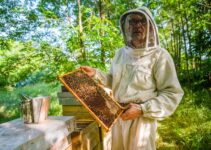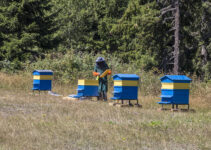Bees do have a keen sense of smell and they communicate with one another through the use of pheromones. They can also detect intruders and threats accurately through their keen sense of smell, making it easy for them to communicate with the hive about threats and other things they have scented. People are commonly told that bees can smell fear, which is why they will chase someone who is running from them but is it true?
Bees can, in fact, smell fear. They do not detect it through sight, but smell it just like the way that they smell predators and other bees. Fear causes the production of pheromones, which bees are very aware of and sensitive to.
If you are considering handling your own bees or having your own hives, this can be a real problem for you if your fear is communicated to them readily.
What do Bees do When They Smell Fear?
Bees that smell fear or a scent that reminds them of a predator can behave in a few different ways. They might aggressively chase the person or thing that has caused them to smell fear, or they might try to sting that person or thing. If the hive is close by, bees can release a pheromone that tells the other bees to become aggressive. This can lead to a swarm.
Many people who have been the victim of a swarm attack would have been better off if they had quietly removed themselves from the situation instead of running in a panic. Sometimes the pheromones that are being shared with the hive will escalate as your fear causes more bees to realize that something is wrong.
Some bees, like honey or bumblebees, will only attack you or become aggressive if you actively try to harm them with intense aggression. Most of these bees will actually try to become defensive and just get away from you rather than attack. Becoming aggressive is much more common for bees like yellow jackets and hornets.
Do Bees Use Their Own Pheromones for Protection?
Bees use their own pheromones to communicate concern or danger to one another, and some other insects can also read their transmissions. This means that the whole hive can communicate an idea due to pheromones and act as one. This is why swarms of bees seem so organized and why a swarm can look just like a big round ball flying through the air.
Their pheromones let them communicate ideas to one another as well as responses, making it seem like the hive is communicating by telepathy. In reality, they are communicating with their sense of smell. This is why it is so important to be sure that you are not fearful if you are handling bees that you have in a hive on your property.
How do Bees Smell Fear?
Bees have a sense of smell that works a lot like the sense of smell that humans use. In people, smells are collected through the palate in the mouth, which then tells the olfactory system to sort out what it is smelling. In bees, an olfactory system is used to collect scents and provide information to the brain, but this system is not as nuanced as in humans.
Bees use their antennae to collect scents, which means that when you see a bee “touching” a flower with its antenna, it is actually smelling it. Bees are commonly drawn to aromatic flowers like lavender because they like the smell of flowers with a stronger scent.
Bees are focused on large ideas and warning signs like fear or aggression, so they are quick to pick up this kind of pheromone from someone that is scared. Bees might not be smelling fear in the way that you think of smelling fresh bread or your favorite coffee drink, but their olfactory system still collects smell inputs. These inputs are turned into responses by the bees individually or by the whole hive.
Do Bees Only Communicate With Pheromones?
Bees actually do not only communicate with these chemical signals that they send out. They also do specific dances that tell other bees about the pollen they have found and many varieties have mating dances that are performed before the queen bee as well.
Bees also see colors and that is how they are able to figure out which flowers are the right ones for them to visit. They do not need to share this information with other bees, as the colors that they are seeing will be just as vivid to other bees nearby. Pheromone communication is used most often in beehives for protective behaviors rather than day-to-day communication.
The task of setting off the pheromone alarm is actually done by Guard Bees who watch out for the hive. These bees are placed outside the hive to make sure that no bees come inside that are not part of the hive and to warn of danger to the hive from animals or humans nearby. These bees might actually attempt to push out bees that are returning with pollen they have collected because they will sometimes not smell right to the Guard Bee.
This is because all the bees in the hive smell like the queen, which is how the Guard Bess recognizes them. If foragers have gotten exposed to lots of pollen or have been away for a while, they might lose enough of the scent of the queen that the Guard Bees are not sure they recognize them.
Can Bees Smell Things Besides Pheromones?
Some studies have been done to try and train hives of bees to smell items like TNT. There has been some success with these projects and more studies are needed to see if this training can be used to promote better hive health or bee behavior in other ways.
The thing that these studies have shown clearly is that bees do have a keen sense of smell and they can smell things that are not pheromone-based. This might explain why sometimes people with a strong perfume on will attract all the bees in the backyard when they go outside. There is some evidence that when humans have been exerting and are sweaty that this might communicate scents to a beehive that leads to an aggressive response.
The fascinating accuracy of the sense of smell of bees that has been revealed by these studies shows just how much information bees are collecting from their environment in the form of smell. It was once thought that colors and the behavior of other bees told the rest of the hive how to react to things, but it is clear now that smell is a big factor in this process.
Bees Can Smell Fear
While it is true that bees can smell fear, you should be fine even if you accidentally run into a hive if you do not panic. Moving slowly and with as much calm as you can muster can help you to escape a swarm attack if you accidentally get too close to a hive. For those who want to keep their own bees but are concerned about their own fear causing negative reactions, it might be best to hire a company to keep your bees for you so that they do not swarm.
https://beemission.com/blogs/news/bees-and-smell
https://labs.biology.ucsd.edu/nieh/TeachingBee/honeybee_aggession.htm
https://aquila.usm.edu/cgi/viewcontent.cgi?article=1213&context=masters_theses




